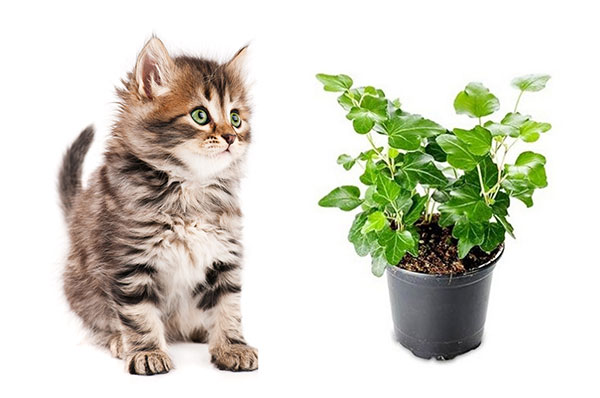Cats are widely famous for their sheer curiosity. A cat will readily check out anything in the house or the backyard that doesn’t seem to belong.
Unfortunately, this curiosity may lead them to consume certain foods, plants, and various home-based products considered toxic for them.
English Ivy is one of the plants that veterinary officers cite as potentially toxic to cats. So, if you’re a proud cat owner who also happens to have plenty of English Ivy growing in your garden or backyard, you may find yourself wondering, is English Ivy poisonous to cat?
Yes, English Ivy is highly poisonous to cats. While many herbivorous animals like deer can comfortably graze on English Ivy, ingesting the plant can be disastrous for cats.
The toxicity of English Ivy for cats comes from a cocktail of chemicals secreted by the plant, most notably Triterpenoid saponins and polyacetylene compounds. If consumed, English Ivy can trigger a range of symptoms, including vomiting, diarrhea, drooling, seizures, and even coma and death.
Read on as we uncover all the potential risks of English Ivy for cats.
Table of Contents
More About English Ivy
The English Ivy is a species of flowering, evergreen plant from the ‘Ivy’ genus in the ‘Araliaceae’ family. The plant goes by numerous aliases, including the European Ivy, Californian Ivy, Branching Ivy, Needlepoint Ivy, Glacier Ivy, Sweetheart Ivy, Common Ivy, or simply Ivy. It’s scientifically known as Hedera helix.
The English Ivy grows natively in most of Europe and western Asia. It’s characterized by its rampant nature and can grow spontaneously in the wild as well as in most waste spaces, gardens and backyards. The plant typically grows on walls, tree trunks, and fences without requiring any human assistance.
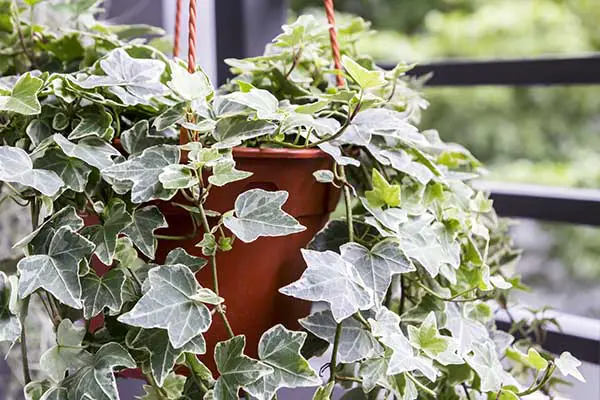
Extracts obtained from various parts of the English Ivy have been used in folk medicine from time immemorial, particularly to treat cough, bronchitis, and throat irritation. Initially, both the leaves and berries of the plant were administered orally as an expectorant. However, subsequent research established that the plant could pose some serious side effects.
For instance, the leaves of the English Ivy have been cited for their ability to cause severe contact dermatitis. The plant’s berries are now also considered somewhat toxic to humans. That begs the question, is English Ivy safe for cats?
Generally, most plants considered toxic to humans also tend to be poisonous to cats. The same appears true for English Ivy.
How Toxic Is English Ivy To Cats?
The toxicity of English Ivy comes from the high concentration of triterpenoid saponins in the plant’s leaves and fruits.
Triterpenoid saponins are the glycoside of pentacyclic oleananes associated with potentially severe intoxication in mammals. They include alpha-hederin, hederasaponin B, hederasaponin C, hederasaponoside B and C, rutin, emetine, caffeic acid, and chlorogenic acid.
Polyacetylene compounds in the Ivy, such as polyacetylene terpenoids, also account for some of the plant’s toxicity. Examples of polyacetylene terpenoids found in the plant include falcarinol and didehydrofalcarinol.
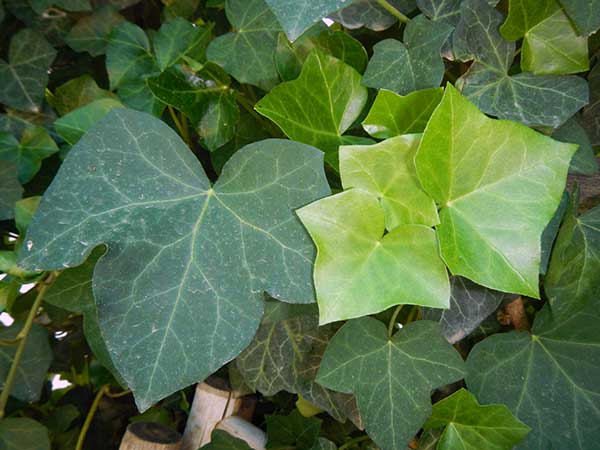
But just how poisonous is English ivy to cats?
Exposure to the triterpenoid saponins and polyacetylene compounds found in the English Ivy has been linked to anemia in animals like cats and rabbits.
Symptoms of anemia in cats include;
✔ Pale gums
✔ Elevated heart rate
✔ Low blood pressure
✔ Increased breathing rate
✔ Lethargy
✔ Sleepiness
✔ Increased water intake and possibly increased urination
✔ Reduced appetite
✔ Drooling
✔ Seizures, which could escalate into convulsions, collapse, coma, and death.
Besides anemia, ingesting English Ivy could also wreak havoc in your cat’s digestive system.
- One (1) 14 lb. Bag - Purina Pro Plan High Protein Cat Food With Probiotics for Cats, Shredded Blend Chicken and Rice Formula
- High protein formula, with real chicken as the first ingredient. Fortified with guaranteed live probiotics to support digestive...
- Crunchy kibble and meaty, shredded pieces for a delicious mealtime experience. Used to be known as SAVOR Shredded Blend Chicken...
Last update on 2024-10-18 / Affiliate links / Images from Amazon Product Advertising API
It’s worth noting that cats are obligate carnivores. As such, they derive their nutritional needs exclusively from a diet of animal protein.
That’s not to say that cats cannot consume plant-based foods from time to time. In fact, you’ll occasionally catch your kitto nibbling on grass blades in your backyard or garden.
In small amounts, plant-based foods like tree leaves may offer relief from constipation. However, ingesting large amounts of plants and plant-based products could trigger gastrointestinal distress in cats. In the case of English Ivy, the situation is complicated further by the fact that this plant also contains potentially toxic chemicals.
Some of the symptoms of gastrointestinal distress you may notice as a result of your cat eating English Ivy include;
✔ Nausea and vomiting
✔ Diarrhea, which might result in dehydration
✔ Abdominal discomfort
How does English ivy poisoning occur?
Ivy poisoning in cats mostly occurs upon ingestion of the plant’s leaves, stems, flowers, pollen, or seeds. Some cats may also develop Ivy toxicity upon contact with the leaves, flowers, or stems of the plant. This may result in a skin condition known as contact dermatitis.
Contact dermatitis is a sudden skin rash triggered by exposure to potentially allergic substances.
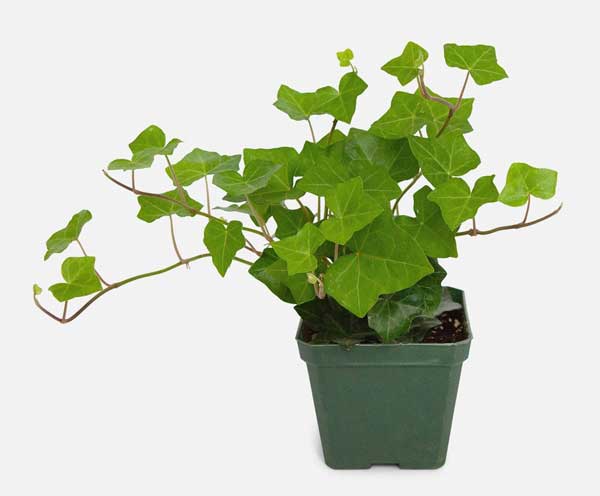
You might have always wondered, is English Ivy poisonous to touch?
As we’ve just pointed out, skin contact with English Ivy could be just as disastrous to your cat as ingesting extracts from the plant.
Symptoms of contact dermatitis in cats include;
✔ Pain, inflammation, and/or redness of the area of the skin that came in contact with the plant,
✔ Skin irritation, as is characterized by restlessness and a need to scratch or groom the area,
✔ Sneezing, coughing, and/or wheezing,
✔ Loss of hair, usually due to overgrooming,
✔ Matted hair, usually resulting from excessive licking,
✔ Scabs, sores, or acne-like bumps,
✔ Crust or dandruff in the area affected,
✔ A distinguished patch in the area of skin affected,
✔ Foul odor.
Like most toxic compounds, the severity of the symptoms of English Ivy for cats depends on the amount of the plant that your kitto has been exposed to. Factors like the cat’s age, breed, and general health condition may also play a role in determining the severity of Ivy side effects.
For instance, kittens and senior cats may exhibit more severe reactions to English Ivy than adult cats.
The side effects of English Ivy may also be more severe for long-haired cat breeds like Persians and Maine Coons. That’s especially in the case of contact dermatitis.
In terms of general health condition, cats with suppressed immunity may experience more severe symptoms of English Ivy. Examples include sick cats, cats recovering from a surgical procedure, expecting cats, and breastfeeding cats.
- EASY TO USE, IMPACTFUL RESULTS: Collect a sample, package it up, and send it securely back. Just register, swab, return with the...
- MOST COMPREHENSIVE BREED & TRAIT: Our test distinguishes over 20+ distinct breeds and 50+ trait markers with the most...
- SCREEN FOR 40+ GENETIC DISEASES: Get peace of mind by screening for 64 health markers associated with 43 diseases for which your...
Last update on 2024-10-18 / Affiliate links / Images from Amazon Product Advertising API
Will English Ivy kill a cat?
In most cases, your cat may not drop dead after eating English Ivy. But depending on the amount of Ivy that your cat has been exposed to, the resultant symptoms could be potentially deadly. That’s especially if you do not seek urgent medical interventions.
Do Cats Know Not To Eat Poisonous Plants?
Unlike humans who are incredibly intelligent, our feline friends may not always know which plants are potentially toxic to them. So, a cat will be just happy to chew, ingest, or rub himself on English Ivy plants.
The fact that cats like to chew plants makes the situation even grimmer.
Although cats are evolutionary hunters, these animals are also noted for their penchant for chewing plants. Cats chew plants for several reasons, including exploring with their mouth.
Like most quadrupeds (four-legged animals), cats investigate their surroundings using their senses of smell and taste. You may have observed your cat sniffing and even chewing a new toy. It’s his own way of checking the toy out and getting a rough feel of what it’s all about.
Unfortunately, cats may also end up putting potentially harmful substances into their mouths, including Ivy leaves. And the consequences may be disastrous for the unsuspecting animal.
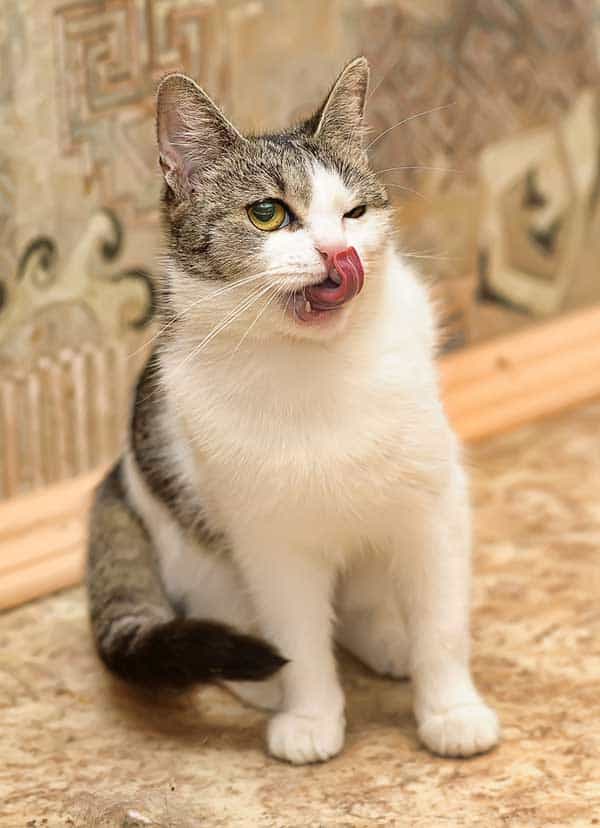
Another reason cats like to nibble on plants is that it helps them ease digestive issues. Plants specifically help in inducing vomiting, which is a welcome relief for constipated cats.
Your cat could also turn to plant chewing as a way of correcting fiber deficiency.
Cats that do not receive enough stimulation may also redirect their pent-up energies towards chewing plants. This is more common with cats that are abandoned for longer durations without provisions for physical and mental stimulation. The resultant loneliness and boredom may cause the cat to engage in bad or self-destructive behavior like nibbling on toxic garden plants.
In the worst-case scenario, cats that lead lonely lifestyles could suffer from an anxiety disorder known as separation anxiety. Such cats tend to get overly anxious whenever their owners are about to leave for work or when they return home. Unusual feeding and potty habits, as well as compulsive behaviors like excessive grooming, are other symptoms of separation anxiety.
What to Do If Cat Eats English Ivy
Having already highlighted the numerous health risks of English Ivy for cats, you could now be wondering, ‘what should I do if my cat ate English Ivy?’
The first thing to do if you suspect that your cat ate English Ivy is to establish the quantity of the plant that the animal has consumed. That may not always be easy if your garden is littered with Ivy plants. But if the plants are concentrated in one spot, you can go and manually check for nibbled leaves and stems.
Once you have a rough idea of the amount of English Ivy that your cat has been exposed to, know the symptoms to look out for.
In most cases, symptoms of anemia and gastrointestinal distress suggest that your cat may have ingested Ivy leaves. On the other hand, symptoms of contact dermatitis and allergy could indicate that the animal may have rubbed his body or face against Ivy plants.
It’s important to manage the symptoms and stabilize your cat before taking him for a professional checkup. You can manage vomiting and diarrhea through rehydration or application of activated charcoal to prevent further absorption of toxins into the cat’s body. In the case of oral irritation, you can offer the cat something tasty, such as milk, salmon, or other cat treats.
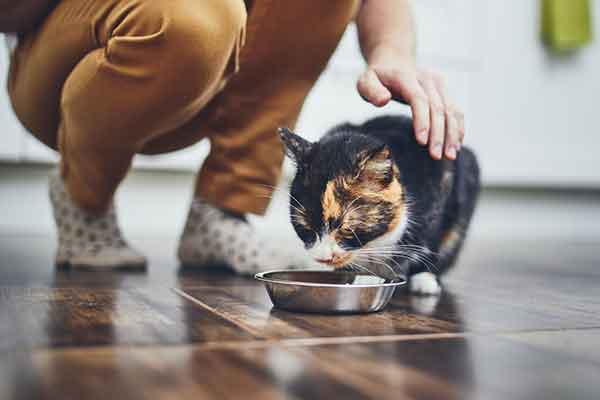
Once your cat is stable, take him to the vet immediately. The vet will perform a raft of diagnostic tests to determine the severity of toxicity, after which they’ll recommend the most appropriate treatment plan.
Now, it’s important to note that when it comes to English Ivy and cats, it’s always better to prevent rather than cure.
You can’t always account for your cat’s whereabouts, especially when he’s on the prowl. But at least, you can eliminate Ivy plants from your garden to prevent your cat from ever coming into contact with them.
If you fancy English Ivy and want them in your garden or yard, you can apply citrus spray on the plants to deter cats from venturing near them. Chili powder and aluminum foil are other effective deterrents you can use to keep your cats away from Ivy plants.
You could also install motion-activated water sprinklers. Most cats hate water and would rather stay away from your Ivy-populated garden than get their paws wet.
Other measures you can implement to prevent your cat from coming into contact with Ivy plants include offering the cat enough toys for maximum physical and mental stimulation and feeding the cat a balanced diet.
So, Is English Ivy Harmful To Cats?
Although we’ve already mentioned it throughout this post, it warrants repeating that English Ivy is highly toxic to cats. Exposure to these plants could trigger a host of deadly symptoms.
So, if you can get rid of English Ivy plants from your garden and yard, then by all means do so. If you fancy these plants for their ornamental value, find a way of deterring your cat from coming into contact with them.
Checkout Our Favorite Cat Products
1. Best Online Course For Cat Parents
Our favorite: The Cat Language Bible (How to Finally Understand And Speak to Your Cat) – A new form of cat to human communication that many cat owners have dreamed about… but few have actually thought possible.
2. Best Immune Support For Cats
Our favorite: Tomlyn Immune Support – Best Supplement for Cats and Kittens.
3. Best Cat Treats
Our favorites: LIFE ESSENTIALS All Natural Freeze Dried Chicken And Sheba Meaty Tender Sticks – Both are Great.

